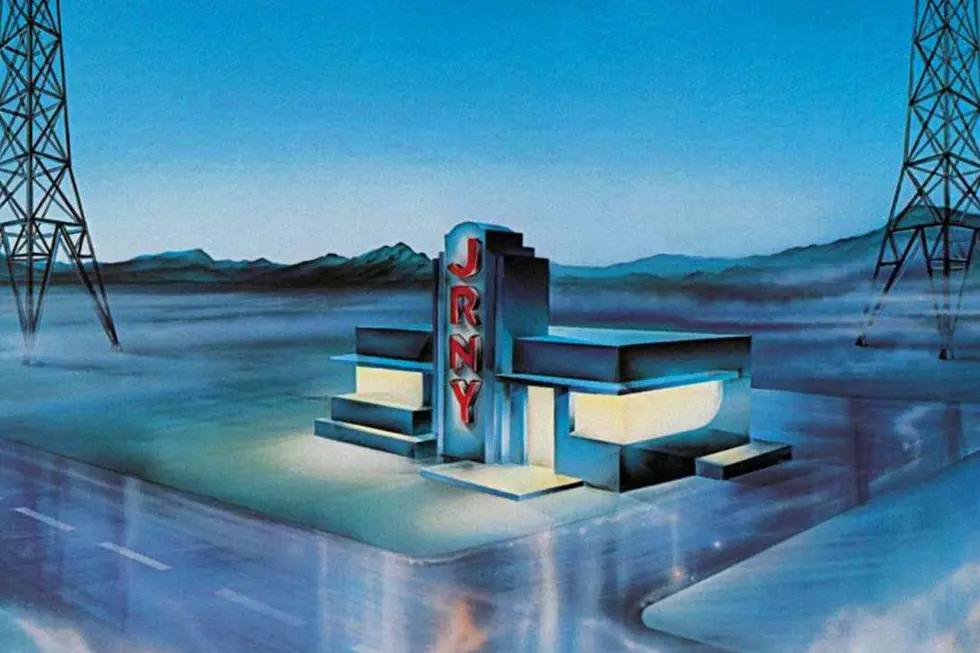
How Journey Pared Down, Then Hit Again With ‘Raised on Radio’
Nothing lasts forever — not even the incredible streak of hits Journey started in the '80s. And as the second half of the decade dawned, the band was falling apart.
In addition to the traditional wear and tear of the recording/touring cycle that Journey had been on since the early '70s, the mid-'80s proved particularly trying on a personal level for singer Steve Perry, who had to cope with his mother's terminal illness just as the band was gearing up to record the follow-up to 1983's Frontiers. Emotionally drained by the looming reality of a loved one's death, Perry nonetheless took on the responsibility of producing the band's next album — a step many on the outside saw as a sign of his complete creative takeover, but one he insisted had everything to do with protecting their musical identity after years of multi-platinum success.
"It was not easy for her, her sickness, as it was not easy for me with the pressure of the album and the pressure of producing it," Perry told the Journey fan club in a 1985 interview. "It was a conscious decision by the band to have me produce it; they wanted me to do it. It really wasn't anything else, like some people thought. It wasn't that Steve Perry was coming back into Journey to change things. It's the other producers that we were afraid would change the band's sound."
The band's sound, at this point, was largely identified with three things: Perry's vocals, Neal Schon's guitar and Jonathan Cain's keyboards. Not coincidentally, the trio had also cemented itself as Journey's primary songwriters — and although the group had always been a collection of talented and distinctive players, it was Perry, Cain and Schon who drove the development of the new LP.
It was a process that would ultimately see bassist Ross Valory and drummer Steve Smith squeezed out of the lineup and replaced by session musicians — a move Smith later attributed to the advent of recording technology allowing for machine-driven demos that dictated parts to musicians who'd always been able to allow their playing to develop organically.
Watch Journey Perform 'I'll Be Alright Without You'
"I couldn’t play with a click track well during that time. It was new for me, a new experience," Smith told Jrnydv.com. "The problem was they wrote all the music with the technology. And that was a big shift — a paradigm shift — of how we did business. We used to write organically. But that record was written in Jonathan’s music room with machines — without Ross and me there. So by the time we came into it, it was hard for us to get ourselves not only invested but physically into it to the point where we could own the parts. It was the first time that they had written for us."
A handful of Smith's performances would be held over for the final product, but for most of the record, drumming duties were handled by Larrie Londin, a prolific pro who'd worked with Perry on his Street Talk solo LP. Valory, meanwhile, was primarily replaced by session ace and future American Idol judge Randy Jackson. With a handful of other personnel — including engineer Jim Gaines, who served as an associate producer alongside Perry — the band tracked the new material at Bay Area studios throughout late 1985.
The end result, titled Raised on Radio, couldn't help but sound somewhat different from the Journey fans had come to love — and yet with Perry at the mic, Cain at the keyboards and Schon on guitar, it was more than close enough for most listeners. Fans turned out in droves for the new LP upon its arrival on May 27, 1986, sending the record to No. 4 on the charts and giving the band yet another platinum album in the process. Radio programmers were similarly enthused, helping Journey notch four more Top 20 singles — "Be Good to Yourself," "Suzanne," "Girl Can't Help It" and "I'll Be Alright Without You" — while the title track earned additional heavy rotation on rock stations and "Why Can't This Night Go on Forever" turned into a midsize adult contemporary hit.
Still, as commercially successful as the record was, the personal and creative attrition Journey had suffered between Frontiers and Raised on Radio took its toll. By the end of the tour in early 1987, Perry in particular was, as he'd later put it, "toasty" and ready for a break. Unsure of what he wanted to do next but desperate to take an indefinite period away from the spotlight, he walked away from Journey, sending the group into a hiatus that would last for a decade.
The Best Song From Every Journey Album
Think You Know Journey?
More From KKTX FM










